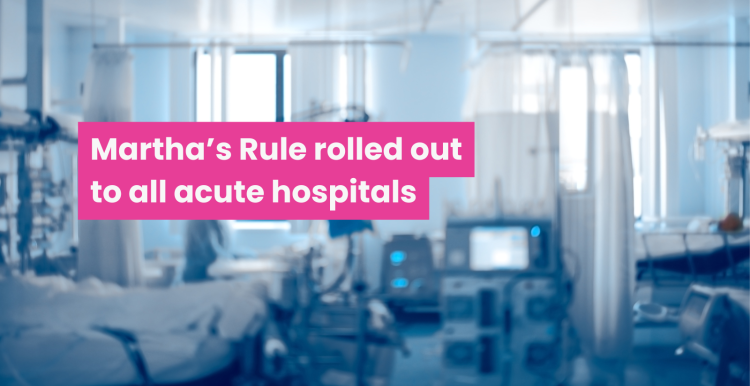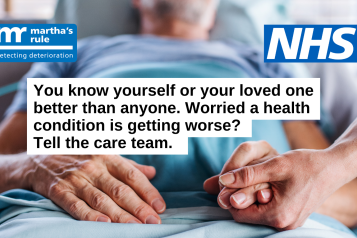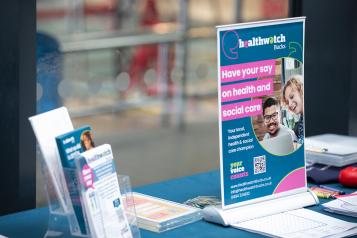Martha’s Rule rolled out to all acute hospitals

In May 2024, NHS England announced the rollout of Martha’s Rule across 143 pilot sites. The positive results from the first year have led the NHS to expand its use to an additional 67 sites – meaning all 210 acute inpatient sites in England will offer the service.
Martha’s Rule is a major patient safety initiative in hospitals encouraging patients, families and carers to speak to the care team if they notice changes in someone’s condition.
It also provides them with a way to seek an urgent review if their or their loved one’s condition deteriorates – and are concerned this is not being responded to.
Staff can themselves ask for a review from a different team if they are concerned the appropriate action is not being taken.
Martha’s Rule is named for Martha Mills, a 13-year-old who died in 2021 after developing sepsis in hospital, where she had been admitted with a pancreatic injury after falling off her bike.
Martha’s family’s concerns about her deteriorating condition were not responded to, and in 2023 a coroner ruled that Martha would probably have survived had she been moved to intensive care earlier.
Between September 2024 and June 2025, there were 4,906 calls made to Martha’s Rule helplines to escalate concerns about care – leading to 241 potentially life-saving interventions being triggered.
Merope Mills and Paul Laity, Martha’s parents, said:
“It would be Martha’s 18th birthday today, another milestone she has missed as a result of the poor care and hospital errors that led to her unnecessary death.
“We feel her absence every day, but at least Martha’s Rule is already preventing many families from experiencing something similar.
“The figures prove that lives are saved when patients and families are given power to act on their suspicions when they feel doctors might have got it wrong and their voice isn’t being heard.
“We are pleased to know more hospitals are taking up Martha’s Rule and look forward to a time when every patient in the UK knows about the initiative and has easy access to it”.
You know yourself or your loved one better than anyone.
You may notice small changes before they show up in routine measurements. Telling the care team about these changes can help them detect deterioration early, so they can take action to prevent more serious health problems.
If you notice changes which could suggest a health condition is getting worse, please tell any of the staff looking after you or your loved one.
If, after speaking to the care team, you remain worried and feel your concerns are not being addressed, call for a rapid review.
Some changes that you may notice before anyone else:
- The patient seems different to usual (not themselves)
- Breathing differently
- Sweating or unusual skin colour
- Reduced urine output or not passing urine
- More sleepy than usual or confused
- Hands feel cold or very hot
- In pain and looks uncomfortable
- You are worried about their condition.
When to call for a rapid review (Call for Concern):
- you have ongoing concerns after you have spoken to the ward nurse or doctor
- there is a noticeable change in your own, or the patient's condition and the ward team is not recognising your concern.
Signs of deterioration to look out for in children
To help the care team detect the early signs of deterioration, please tell someone if your child:
- Has a temperature – sweating or hot or cold to the touch
- Has a high pitched or abnormal cry
- Has any changes to the appearance of their skin (pale, rash or sores/blisters).
- Is less responsive or floppy, difficult to wake
- Is irritable and will not settle
- Is not interested in feeding / drinking or eating
- Is breathing faster than normal, grunting with each breath or wheezing
- Is weeing much less or has blood in their poo
- Or about anything that worries you that isn’t like your child usually


